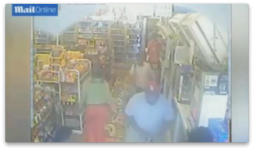I'm not sure if these numbers cleanly disaggregate - but I've done some back of the napkin calculations and discounting the 'license' stops the disparity index is still .44 and 1.36 respectively. Calculating searches per stop, while discounting arrests for warrants, I still figure about 6% and 9% respectively.
9% searches without an outstanding warrant for blacks is quite clearly wrong, because 12% of blacks that are stopped are searched, and 8% (2/3 of those searched) of blacks that are stopped are arrested for pre-existing outstanding warrants. Arrests inherently entail searches and the numbers show that about 70% of searches of blacks occur as a result of an already in-process arrest (mostly for warrants). That only leaves about 1/3 of searches being due to factors other than an outstanding warrant.
You have to subtract the number of those with warrants from the number searched, for each race. For blacks, that means 562 - 369 = 193. And for Whites, 47 - 14 = 33. Then you divide these by the total number of stops for each group (also subtracting the warrants from the number of stops). For blacks that means 193 / (4632 - 369) = .045 or 4.5%. For whites that means 33 / (686 -14) = .049 or 4.9%. This gives you the % of stops that lead to searches, where the was no warrant. I had done them in my head with rounding but my earlier 4% versus 5% is pretty close to 4.5% versus 4.9%. Either way, whites are searched in a higher % of stops without warrants. Also, among drivers without warrants, the arrest rate is higher for whites (3.3%) than blacks (2.7%).
Nor am I sure that your interpretation of the necessity is valid. That is to say, the police still have wide discretion whether to even run someone's plates.
Sure, but when they do and comes back with a warrant, the have to stop the person and usually arrest them. Given that criminal convictions are about 3 times higher among blacks, it is extremely likely that the % of those with warrants is similarly higher in the general population. Therefore, even if plates were run at random, the % of time a warrant would pop up and require a stop rate would be about 3 times higher for blacks, which is close to what it is in Ferguson.
We have no assurances that the proportionality of the findings in a stop actually map to the broader populace. Nor do we have assurance that these figures account for false positives. In my own stop I'd surmise that I'd be listed under the 'license' category, even though in actuality there was no issue with my registration status.
But you don't have any warrants for a prior crime, so it isn't relevant. Blacks are not getting searched more (rather less), when no warrant exists. Some people without warrants get searched, but in Ferguson you'd be less likely than a white person to get searched during a stop.
But my point was a broader one than just the limited data on Ferguson traffic stops. Usage rates certainly are a valid metric when considering the broader subject of proportional rates of incarceration, and I'm fairly certain that users are arrested much more frequently than dealers
Sure, but drug use is actually one of the incarcerated crimes where the racial disparity is the smaller, along with other non-violent crimes like public drunkenness, vandalism, and violating liquor laws. The bigger disparities exist for the more violent crimes, and the disparity in trafficking arrests is larger than for use arrests.
Also, a large % of mere "use" convictions are the outcome of attempts to bust dealers and traffickers but convicted on a lesser charge. Also, if the cops focus on areas where the dealers are, then people using drugs in those areas are far more likely to get nabbed for just using.
Blacks are more likely to be arrested and convicted for almost all types of crimes, and especially violent crimes. A large portion of that is due to SES (the disparity is much less when compared only to lower SES whites). That guarantees a greater likelihood of having a warrant when pulled over and therefore greater likelihood of search and of arrest.
The bottom line is that among the people in Ferguson without warrants for prior crimes that essentially guarantee a search and arrest,
blacks are LESS likely than whites to be either searched or arrested when pulled over.
That fact is incompatible with what is clearly predicted by any theory that the cops are so racist that they hunt for any excuse to hassle and arrest blacks, especially since people pulled over for a traffic or equipment violation would be easy targets for this.
The greater "stop" disparity is compatible with such a theory, but the overall disparity in stops is in line with the size predicted by the greater % of outstanding warrants among blacks, even if checking for warrants was by running a plate was done in proportion to population size. That said there is some unaccounted for disparities that might be due to racist hassling, such as the disparity in being pulled over for a moving violation. But again, the theory that this results from "invented" rather than real differences in violations by racist cops cannot predict a difference in invented stops without also predicting a difference in invented reasons for search and arrests, and yet the data refute such a prediction with searches and arrests.

